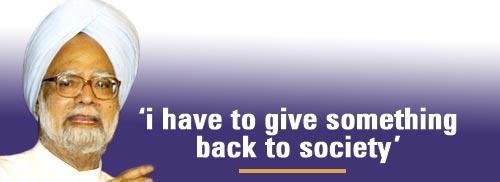Home > News > Have you met Dr Manmohan Singh?
The Rediff Special / Aruna Srinivasan in Chennai
May 22, 2004

It was in 1999 that I had the opportunity to meet Dr Manmohan Singh in Delhi on two occasions. This happened during the course of my work as a journalist; I used to contribute to the Tamil weekly Kunkumam.
Once, I did an exclusive interview with him.
The other time, I trailed him during his campaign for the 1999 general election. He lost, but his personality was so unforgettable that the result seemed insignificant -- at least, I thought so.
During the interview, I got a glimpse into his way of life, his philosophy and his idea of governance.
Asked about his vision for India, he responded optimistically, "I don't know if Indians have faith in God, but God still has some faith in India. While civilisations across the world are wiped out over a period, our Indian civilisation, which is over 5,000 years, has stood the test of Time and is still vibrant. This is what gives me hope that God has not yet given up on India."
He said the dictum of Bhagvad Gita -- 'Do one's duty without the expectations of results' -- has been his guiding light.
"In fact, all our Indian scriptures, including our Guru Granth Sahib [the holy book of the Sikhs], emphasises this philosophy," he explained.
When I asked him which areas he would emphasise on if he were to prepare the Union Budget, he said, "What is essential today is to revive the people's confidence in themselves, in the country and in the government."
And how did he plan to do that?
"Undoubtedly, my first job would be to reduce inflation. It is the duty of the finance minister to ensure that inflation doesn't hurt the common man, even as he implements plans that focus on improving the economy. Some people argue that high inflation is the price we pay for a robust economy. I don't agree with this. It is important to bring down the inflation."
It was Minoo Masani's book Our India that first sparked his interest in economics.
His father wanted him to study medicine; in fact, Dr Singh had already joined a medical college. But he soon realised his forte was economics and made the switch.
Dr Singh said he felt indebted to society. "Since most of my education was funded by some scholarship or the other, I feel I have to give something back to society. Although I have had several offers from abroad, I feel my place is in India. In general, life has given me everything that is good. I am contented with my life. There is no sense of want in my life now."
Other snippets from the interview:
Amartya Sen was his senior in Cambridge.
Besides economics, his interests include reading (politics, history, biographies, etc) and classical music (M S Subbulakshmi tops his list of favourite musicians).
He appreciates the simplicity of South Indians and enjoys South Indian food. "It is tasty and has varieties too," he said.
During his campaign trail, he came across as your next-door neighbour.
Party workers sang and danced as he moved from house to house in South Delhi, the constituency he was contesting from. He actually looked lost as, with folded hands, he moved with the aggressive crowd.
When there was confusion among party workers about the route they were to take, or any other aspect of the campaigning, he stood aside silently and watched them sort it out among themselves.
He was not overbearing nor did he throw his weight around. In fact, he absolutely lacked the airs and fancies of a politician!
He cooperated completely with the party workers.
When the crowd got beyond control, when they literally held his hands and took him to some other direction -- another house or a gurdwara -- he obliged with a smile and without making a fuss.
He was a total greenhorn in electioneering, but the public didn't seem to mind that.
"He is one sane man in today's rotten politics," said one bystander.
Another extolled his honesty and simplicity.
A shopkeeper remembered him as the person who revived India's economy.
If he had a drawback, politically speaking that is, it is the lack of a mass base. But I think it is his sense of humility that keeps him back from projecting himself as a leader of the masses.
I hope his performance will speak for him in the future and give him the mass base that he needs.
HAVE YOU READ?
Dr Singh: Upright and conservative
Photograph: Raveendran/AFP/Getty Images
Image: Uday Kuckian